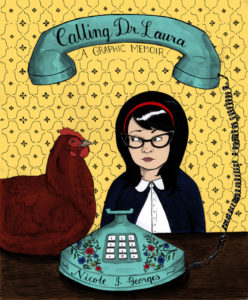Synopsis
When Nicole Georges was two years old, her mother told her that her father was dead. When she was twenty-three, a psychic told her he was alive. Her half-sister, saddled with guilt, admits that the psychic is right and that the whole family has conspired to keep him a secret. Sent into a tailspin about her identity, Nicole turns to radio talk-show host Dr. Laura Schlessinger for advice.
Packed cover-to-cover with heartfelt and disarming black-and-white illustrations, Calling Dr. Laura tells the story of what happens to you when you are raised in a family of secrets, and what happens to your brain (and heart) when you learn the truth from an unlikely source. Part coming-of-age and part coming-out story, Calling Dr. Laura marks the arrival of an exciting and winning new voice in graphic literature.
From: Nicole J Georges
Notes on This Title
Portrays the impact of domestic abuse on the health and well-being of a child.
Awards
2014 Lambda Literary Award for LGBT Graphic Novel
Reviews
“The title of this twee but engaging graphic memoir overstates the role of the famous radio psychologist, who makes a mere cameo. The book is really about the author’s struggle with her secretive family and the mystery of her father’s identity. As a child, Nicole believed her father had died when she was very young. Father figures remained elusive throughout her formative years. After relocating to Portland, Ore., in her 20s, Nicole receives a palm reading as a birthday gift. The results convince her that her biological father is still alive, and she is driven to seek the truth from her fractious relatives. Amid all of this, Nicole juggles difficult romantic relationships with her decision to keep the fact that she is gay from the very same mother from whom she seeks the truth. Georges’s naïve line art and sometimes labored visual storytelling is balanced by humor and incisive characterizations. However, this ambitious family narrative could have used a stronger editorial eye. Despite her story being too long, the author approaches it with the tenacity of a detective. Among other factors—including clever asides and several terrific jokes—a deeply affecting epilogue makes Georges’s tale well worth the telling.” (Source: Publishers Weekly)
“Nicole Georges grew up believing she became a half-orphan when her father died in his 30s, but when a palm reader suggested that her father — the one her mother had told her died of colon cancer — might still be alive, she began to look more closely at the whole of her unexamined life. This personal reconsideration is the heart of Calling Dr. Laura, an inventive graphic memoir that recounts this quest, as well as Nicole Georges’ coming into her own as an artist and daughter.” (Source: NPR)
